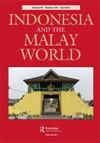Thinking through the s(k)in
IF 0.9
3区 社会学
0 ASIAN STUDIES
引用次数: 2
Abstract
ABSTRACT Indonesian male-bodied and feminine identified subjects, locally and internationally known as waria, commonly claim to have the heart and soul of a woman. While waria form a visible social category, they suffer from various prevailing stigmas, of which a significant share is tied to some cultural assumptions embedded in the mainstream understanding of Islamic morality. While most waria do not feel comfortable practising their religion in public, many describe their subjectivity along the distinction between their bodies and their inner sense of gender as God’s will. Consequently, permanent bodily modifications are associated with the notion of sin. These conceptions have enabled a specific form of Indonesian transgender embodiment. This article addresses the bodily negotiations of waria against the background of their religious sensitivities and aspirations for belonging. The spiritually grounded sentiments in relation to their bodies and the sense of gender on one hand, and the signs of increased focus on embodied expression of religiosity among waria on the other, signal the desire for reimagining belonging to Indonesian (Muslim) society. Religious sensitivity, while being the major cause of anxieties on both personal and societal levels, has provided waria with important frameworks which enhance their own relative acceptance of their embodied subjectivity.思考中的s(k)
印度尼西亚的男性和女性主体,在当地和国际上被称为waria,通常声称拥有女性的心脏和灵魂。虽然瓦里亚形成了一个明显的社会类别,但他们遭受着各种普遍的耻辱,其中很大一部分与伊斯兰道德主流理解中嵌入的一些文化假设有关。虽然大多数瓦里亚人对在公共场合信仰宗教感到不自在,但许多人将自己的主观性描述为他们身体和内心性别意识之间的区别,这是上帝的旨意。因此,永久的身体修饰与罪恶的概念联系在一起。这些概念使印尼跨性别者的具体形式得以体现。本文在瓦里亚人的宗教敏感性和对归属感的渴望的背景下讨论他们的身体谈判。一方面,与她们的身体和性别意识有关的精神上的情感,另一方面,瓦里亚人越来越关注宗教信仰的具体化表达,这标志着重新想象属于印度尼西亚(穆斯林)社会的愿望。宗教敏感性虽然是个人和社会两级焦虑的主要原因,但却为瓦里亚人提供了重要的框架,使他们能够相对地接受自己所体现的主体性。
本文章由计算机程序翻译,如有差异,请以英文原文为准。
求助全文
约1分钟内获得全文
求助全文
来源期刊

Indonesia and the Malay World
ASIAN STUDIES-
CiteScore
2.00
自引率
0.00%
发文量
17
期刊介绍:
Indonesia and the Malay World is a peer-reviewed journal that is committed to the publication of scholarship in the arts and humanities on maritime Southeast Asia. It particularly focuses on the study of the languages, literatures, art, archaeology, history, religion, anthropology, performing arts, cinema and tourism of the region. In addition to welcoming individual articles, it also publishes special issues focusing on a particular theme or region. The journal is published three times a year, in March, July, and November.
 求助内容:
求助内容: 应助结果提醒方式:
应助结果提醒方式:


